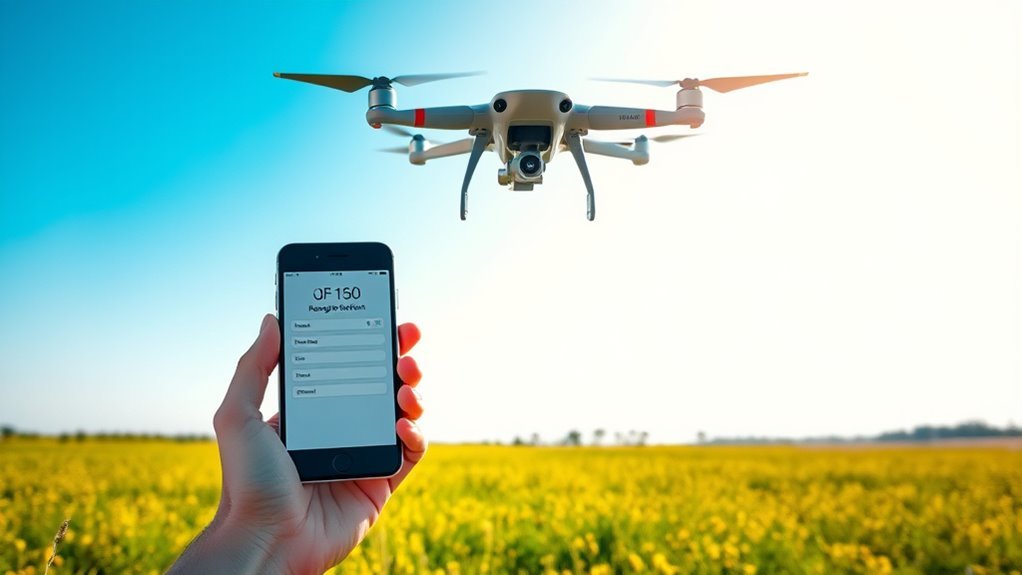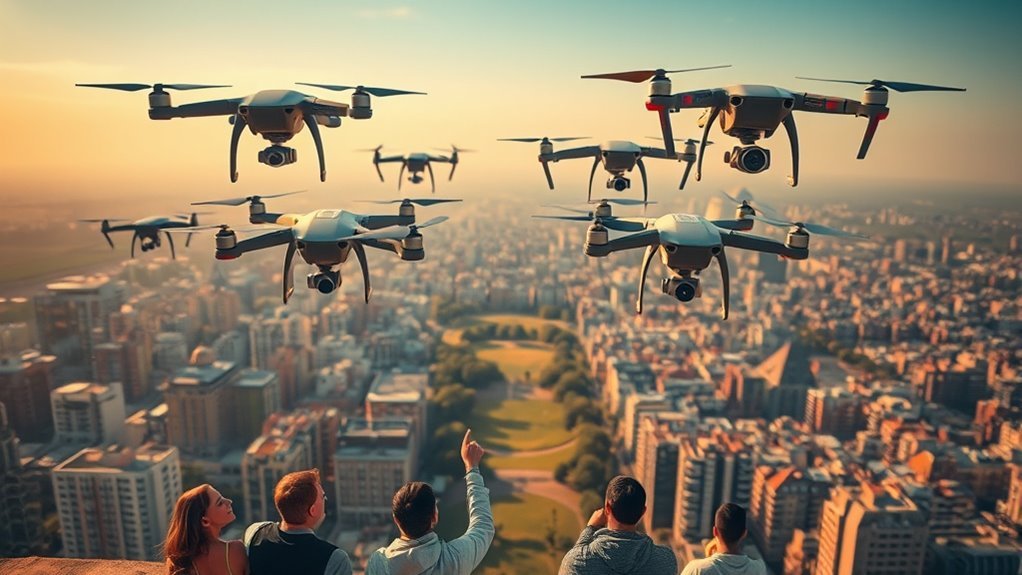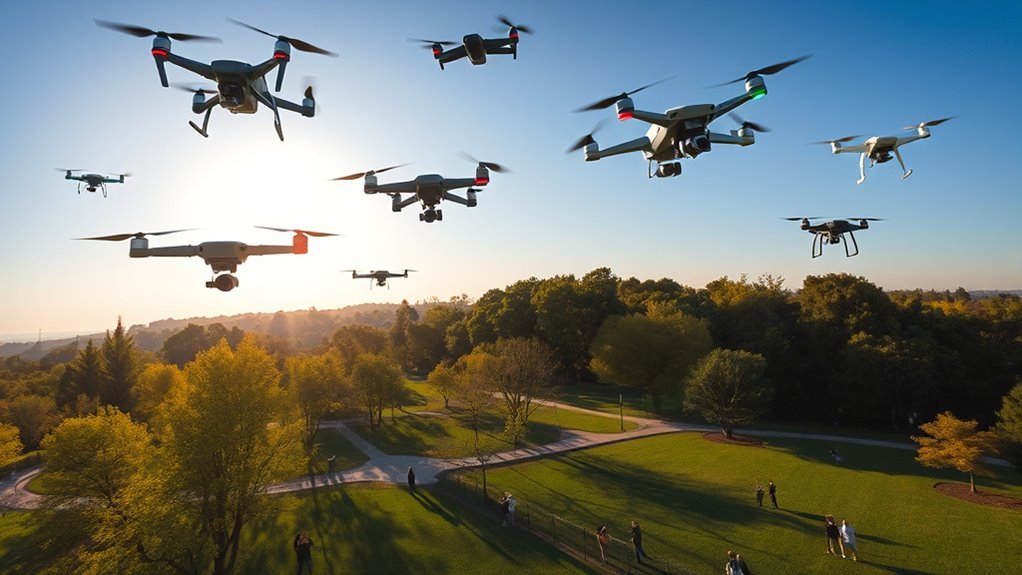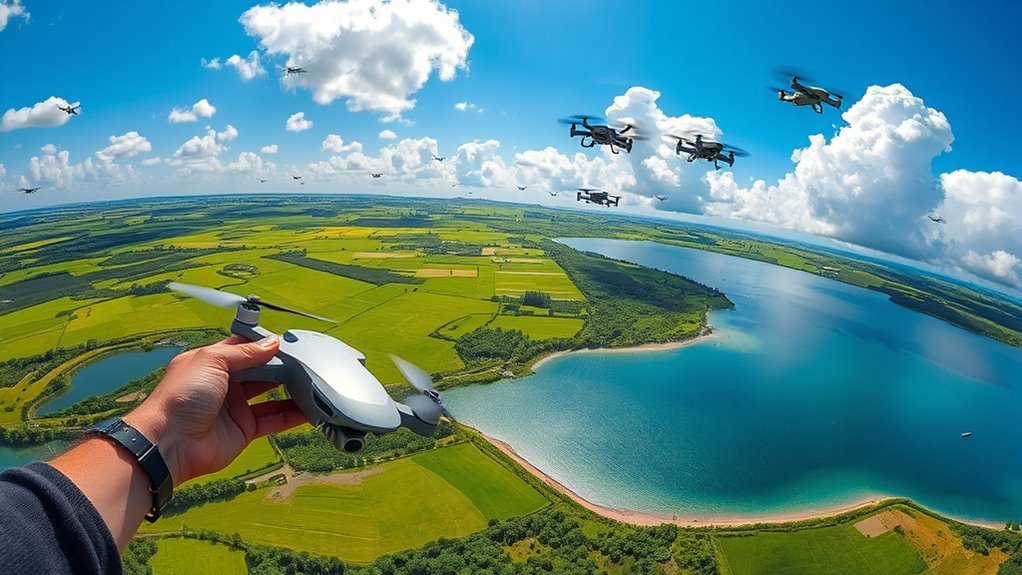Not all drones need to be registered. If your drone weighs over 0.55 pounds or is for commercial use, you must register it with the FAA. Registration guarantees safety and accountability, helping to prevent accidents and manage airspace effectively. Recreational drones under this weight don’t need registration, but it’s wise to reflect on insurance. Understanding the registration requirements can help you avoid penalties and improve your flying experience—there’s much more to know about maintaining compliance and safety.
Understanding Drone Registration Requirements

When it comes to flying drones, how do you know if you need to register yours? Generally, if your drone weighs more than 0.55 pounds, the FAA requires registration. This rule aims to enhance drone safety, ensuring that operators adhere to regulations and maintain accountability. By registering your drone, you not only comply with the law but also gain access to several registration benefits, such as streamlined processes for flying in controlled airspace. Additionally, having your drone registered can help in identifying its owner if it gets lost or involved in an incident. Overall, understanding registration requirements empowers you to enjoy the freedom of flying while prioritizing safety and responsibility in the skies.
The Importance of Registering Drones

Registering your drone isn’t just about complying with regulations; it plays an essential role in promoting safe and responsible flying. By registering, you help guarantee drone safety, which protects both your interests and the rights of others in the sky. This process aids in effective airspace management, allowing authorities to monitor and coordinate drone activity, reducing the risk of accidents. Moreover, compliance with FAA regulations ensures that your drone operations align with established safety standards. It also fosters accountability, as registered drones can be traced back to their owners, deterring irresponsible behavior. When you choose to register, you’re not just following the rules; you’re contributing to a community that values freedom and safety. Ultimately, responsible drone usage enhances your flying experience while guaranteeing a safer environment for everyone in the airspace. Additionally, understanding the legal boundaries of drone operations is vital to ensure compliance with regulations and avoid potential legal issues.
Who Needs to Register Their Drones?

If you’re a recreational drone user, you might not realize that registration isn’t always required. However, commercial operators must register their drones, regardless of size. Additionally, drones above a certain weight and size threshold will also need to be registered to comply with regulations.
Recreational Drone Users
Although many people enjoy flying drones for recreational purposes, not everyone is required to register their devices. If your drone weighs less than 0.55 pounds (250 grams), you don’t need to register it, which is a relief for many hobbyist communities. However, if you’re engaging in recreational flying with a heavier drone, registration is mandatory. This process is straightforward and helps guarantee safety in the skies. By registering, you contribute to responsible drone use and help maintain the freedom to enjoy this hobby. Remember, staying informed about regulations is essential for all drone enthusiasts. So, check your drone’s weight and be part of a thriving community that values both fun and safety in recreational flying.
Commercial Operators Required
While recreational drone users have some leeway regarding registration, commercial operators face stricter requirements. If you’re flying for profit, you must register your drone and get the necessary commercial drone certifications. Here’s what you need to know:
- Registration: All commercial drones must be registered with the FAA.
- Certifications: You’ll need a Remote Pilot Certificate to operate legally.
- Compliance: Adhering to drone industry regulations is essential to avoid hefty fines.
- Insurance: Consider getting liability insurance to protect yourself and your business.
Understanding these requirements not only keeps you compliant but also empowers you to navigate the skies freely. Embrace your passion responsibly, and let your creativity take flight!
Weight and Size Criteria
Understanding the weight and size criteria for drone registration is essential for any operator, as it determines whether you need to register your device with the FAA. Drones weighing more than 0.55 pounds (250 grams) must be registered; this includes the total weight of the drone and any attached equipment. If your drone falls into this category, you’ll need to complete the registration process. Size classification also plays a role in determining operational limits and requirements. For instance, larger drones may be subject to stricter regulations due to safety concerns. By knowing your drone’s weight and size classification, you can enjoy the freedom of flying while remaining compliant with the law, ensuring a safe experience for everyone involved.
Registration Process for Recreational Drones
When it comes to registering your recreational drone, you’ll need to understand the eligibility criteria first. The registration process involves a few straightforward steps that guarantee compliance with regulations. Failing to register can lead to significant consequences, so it’s essential to stay informed.
Eligibility Criteria for Registration
How do you know if your drone needs to be registered? Understanding the registration criteria is vital for ensuring your drone’s eligibility. Here are four key points to take into account:
- Weight: If your drone weighs more than 0.55 pounds (250 grams), it must be registered.
- Purpose: Drones used for commercial purposes always require registration, while recreational use has its own rules.
- Flight Location: Reflect on where you’ll fly; restricted areas often have stricter registration guidelines.
- Age: You must be at least 13 years old to register a drone on your own.
Registration Steps Explained
Registering your recreational drone involves a straightforward process that guarantees compliance with regulations. First, visit the FAA’s official website to access the registration portal. You’ll need to provide basic information about yourself and your drone, including its make and model. The registration fee is minimal, and once completed, you’ll receive a unique identification number. This number must be affixed to your drone.
The benefits of drone registration are significant; it enhances safety, promotes responsible flying, and helps avoid potential legal issues. Understanding the registration process overview equips you with the knowledge to fly freely while adhering to necessary guidelines. By registering, you contribute to a safer airspace and enjoy peace of mind during your recreational flying adventures.
Consequences of Non-Registration
Failing to register your drone can lead to serious consequences that every recreational flyer should be aware of. Ignoring the registration requirements can result in unwanted legal penalties and enforcement actions that could ruin your flying experience. Here’s what you risk:
- Fines: You could face hefty fines that drain your wallet.
- Seizure of Equipment: Authorities might confiscate your drone, taking away your freedom to fly.
- Criminal Charges: In extreme cases, non-registration could lead to criminal charges, impacting your future.
- Insurance Issues: Your insurance may not cover accidents involving an unregistered drone, leaving you vulnerable.
Protect your passion for flying by ensuring your drone is registered. Don’t let non-compliance clip your wings.
Registration Process for Commercial Drones
While maneuvering through the world of commercial drones, understanding the registration process is essential for compliance and safety. First, you’ll need to visit the FAA website to register your drone online. You’ll provide details like the drone’s make, model, and serial number, along with your personal information. Remember, if your drone weighs more than 0.55 pounds, registration is mandatory. After registering, you’ll receive a unique identification number to display on your drone. It’s wise to evaluate drone insurance that aligns with safety guidelines, protecting you from potential liabilities. By following this process, you guarantee that your operations comply with regulations and promote safe flying practices, allowing you to enjoy the freedom of flying your commercial drone responsibly.
Consequences of Not Registering a Drone
Neglecting to register your drone can lead to significant consequences that could impact not only your operations but also your finances. Here are some potential pitfalls you might face:
Neglecting drone registration can result in serious financial and legal consequences, impacting your operations and peace of mind.
- Financial penalties: You could be slapped with hefty fines that strain your budget.
- Legal repercussions: Operating unregistered could expose you to lawsuits or criminal charges.
- Safety violations: Ignoring registration means you might inadvertently breach safety regulations, risking accidents.
- Airspace restrictions: Without registration, you may find yourself banned from certain areas, limiting your flying freedom.
These issues can lead to liability problems and insurance complications, damaging your public perception. Don’t let the thrill of flying turn into a burden; register your drone to enjoy peace of mind and freedom.
Exemptions and Exceptions to Registration Rules
Although most drones require registration, there are specific exemptions and exceptions that can ease the burden for certain users. Understanding these can help you enjoy greater freedom while flying.
| Exempt Drone Types | Description |
|---|---|
| Toy Drones | Weighing less than 0.55 lbs, these are often for recreational use. |
| Certain Racing Drones | Designed for competitions, often fall below weight limits. |
| Military Drone Exemptions | Used for national security and defense purposes. |
| Educational Drones | Used strictly for educational purposes, often exempt from registration. |
| Research Drones | Drones utilized in scientific research may also be excluded. |
These exemptions provide opportunities for specific users to operate without the constraints of registration, promoting a more liberated drone experience.
International Drone Registration Standards
When considering international drone registration standards, you’ll find that requirements can vary considerably from one country to another. Some regions enforce strict compliance measures, while others offer more lenient regulations. Understanding these differences is essential for ensuring your drone operates legally across borders.
Global Registration Requirements
Around 80 countries have established some form of drone registration requirements, reflecting the growing global recognition of the need for regulation in this rapidly evolving technology. While these regulations aim for global compliance, they also present registration challenges that can hinder your freedom as a drone operator. Here’s what you should consider:
- Diverse regulations – Each country has unique rules that can confuse operators.
- Costs – Registration fees may burden those who just want to enjoy flying.
- Time-consuming processes – Lengthy registration can deter users from engaging with the technology.
- Potential fines – Non-compliance can lead to hefty penalties, stifling innovation.
Navigating these hurdles can be frustrating, but understanding global registration requirements is essential for responsible drone use.
Regional Compliance Differences
Understanding the various regional compliance differences in drone registration is essential for operators looking to fly legally and responsibly. Each country has its own set of regional laws governing drone usage, and these regulations can vary considerably. For instance, some countries require all drones to be registered, while others impose limits based on weight or purpose. Compliance variations also exist regarding pilot certification and operational restrictions. As you navigate these differences, it’s important to familiarize yourself with the specific requirements in your region or any region you plan to operate in. Staying informed will not only help you avoid penalties but also guarantee you can enjoy the freedom of flying your drone without legal issues.
Future Trends in Drone Regulation
As the drone industry continues to evolve, it’s becoming clear that future regulations will likely reflect the increasing complexity of this technology. With emerging technologies pushing boundaries, policy adaptations will be essential to maintain balance. Here are some trends to watch for:
- Personal Drone Use: Expect more freedom for hobbyists, but with added safety measures. Innovations like geofencing technology will play a crucial role in enhancing responsible flying practices.
- Commercial Applications: Regulations will tighten for businesses, ensuring accountability.
- Airspace Integration: New rules will facilitate seamless coexistence with manned aircraft.
- Privacy Protections: Increased focus on data security and individual privacy rights.
Additionally, advancements in collision avoidance systems are likely to influence regulatory standards, promoting safer operations in crowded environments. These shifts aim to empower you while ensuring safe and responsible drone usage in our skies. Embracing these changes can help you navigate the exciting future of drone operation.
Resources for Drone Operators and Enthusiasts
With the evolving landscape of drone regulations, operators and enthusiasts need reliable resources to stay informed and compliant. Numerous online platforms, like the FAA’s official website, provide essential information on drone safety and flying guidelines. Joining local drone clubs or online communities can also offer valuable insights from fellow pilots who share your passion. Don’t forget to explore YouTube channels dedicated to drone education, where you can find tutorials on best practices and safety protocols. Additionally, numerous mobile apps can help you check airspace restrictions and weather conditions before you fly. Staying informed not only enhances your flying experience but guarantees you respect the freedoms we cherish in the drone community. Embrace these resources and fly responsibly! Furthermore, understanding drone registration requirements is crucial for avoiding potential fines and ensuring safe operation. Keeping abreast of local regulations will further support your commitment to responsible flying.
Frequently Asked Questions
Can I Fly My Drone Without Registration in Rural Areas?
Flying your drone in rural areas might seem freer, but you still need to take into account drone regulations. Even in remote locations, registration could be required, depending on your drone’s size and purpose. Always check local laws.
How Often Do I Need to Renew My Drone Registration?
Think of your drone like a car; just as you must renew your vehicle’s registration, you need to renew your drone registration every three years, paying applicable registration fees during the renewal process.
What Happens if I Lose My Drone Registration Certificate?
If you lose your drone registration certificate, it’s essential to understand the drone registration importance. You can request a registration certificate replacement through the FAA, ensuring compliance while enjoying your flying freedom. Don’t delay!
Are There Age Restrictions for Registering a Drone?
Did you know that around 60% of drone users are under 35? For the registration process, age requirements typically mandate you be at least 13 in the U.S., ensuring younger enthusiasts can join the aerial adventure.
Can I Register Multiple Drones Under One Account?
Yes, you can register multiple drones under one account during the drone registration process. This simplifies management, allowing you to keep all your drone information in one place instead of creating multiple drone accounts.

